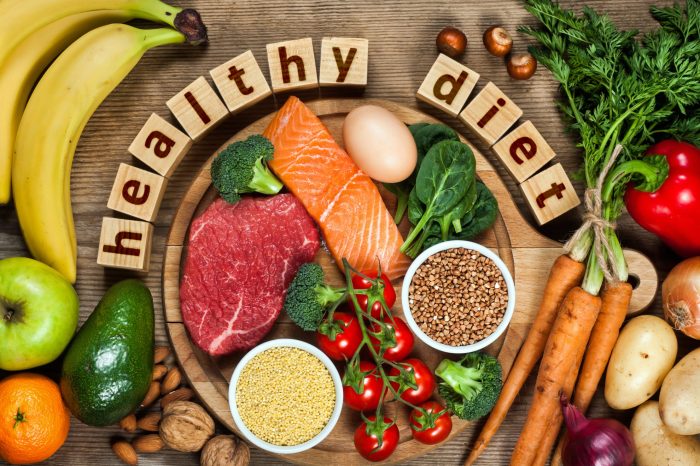Balanced diet, the cornerstone of a healthy lifestyle, encompasses a wide array of nutrients essential for optimal well-being and vitality. Dive into this exploration of the crucial elements that constitute a balanced diet, from nutrient-rich foods to strategic meal planning and beyond.
Embark on a journey to discover how a balanced diet can revolutionize your health and transform your daily habits for the better.
Importance of a Balanced Diet

Maintaining a balanced diet is crucial for overall health and well-being. It involves consuming the right amount of nutrients to meet the body’s needs, while also keeping a healthy balance between different food groups.
Key Components of a Balanced Diet
- Proteins: Essential for muscle growth and repair. Found in sources like meat, fish, eggs, and legumes.
- Carbohydrates: Provide energy for daily activities. Include whole grains, fruits, and vegetables.
- Fats: Important for brain function and hormone production. Healthy fats can be found in avocados, nuts, and olive oil.
- Vitamins and Minerals: Support various bodily functions and immune system. Found in fruits, vegetables, and supplements.
- Water: Hydration is key for digestion, circulation, and temperature regulation.
Benefits of Maintaining a Balanced Diet
- Weight Management: Helps prevent obesity and related health issues.
- Improved Energy Levels: Proper nutrients fuel the body for daily activities.
- Enhanced Mental Clarity: Brain function is optimized with the right balance of nutrients.
- Stronger Immune System: Vitamins and minerals boost immunity and fight off illnesses.
Examples of Improved Health with a Balanced Diet
- Reduced Risk of Chronic Diseases: Heart disease, diabetes, and certain cancers can be prevented with a balanced diet.
- Better Digestion: Fiber-rich foods aid in digestion and prevent constipation.
- Healthy Skin: Nutrient-rich foods contribute to glowing skin and overall appearance.
Nutrients in a Balanced Diet
Eating a balanced diet is not only about the quantity of food but also the quality of nutrients. Essential nutrients play a crucial role in maintaining overall health and well-being.
Essential Nutrients in a Balanced Diet
- Proteins: Essential for growth, repair, and maintenance of body tissues.
- Carbohydrates: Main source of energy for the body.
- Fats: Important for energy storage, insulation, and cell function.
- Vitamins: Necessary for various metabolic functions and immune system support.
- Minerals: Important for bone health, nerve function, and fluid balance.
- Water: Essential for hydration and overall bodily functions.
Role of Macronutrients
Macronutrients, including proteins, carbohydrates, and fats, provide the body with energy and are crucial for various physiological functions. Proteins help build and repair tissues, carbohydrates fuel the body, and fats provide energy storage and support cell function.
Importance of Micronutrients
Micronutrients, such as vitamins and minerals, are essential for overall health and well-being. They play a key role in various metabolic processes, immune system function, bone health, and other vital functions in the body.
Examples of Foods Rich in Essential Nutrients
| Nutrient | Food Sources |
|---|---|
| Proteins | Chicken, fish, eggs, beans, nuts |
| Carbohydrates | Whole grains, fruits, vegetables |
| Fats | Avocados, olive oil, fatty fish |
| Vitamins | Citrus fruits, leafy greens, dairy products |
| Minerals | Dairy products, seeds, nuts, leafy greens |
| Water | Watermelon, cucumbers, soups |
Planning a Balanced Diet
Eating a balanced diet involves careful planning and making smart choices to ensure you are getting all the nutrients your body needs. Here are some strategies to help you plan a balanced diet:
Creating a Well-Balanced Meal Plan
- Include a variety of foods from all food groups, such as fruits, vegetables, whole grains, lean proteins, and dairy products.
- Focus on portion sizes to avoid overeating and ensure you are getting the right amount of nutrients.
- Plan your meals in advance to avoid last-minute unhealthy food choices.
- Consider your personal preferences and cultural background when creating your meal plan to make it more enjoyable and sustainable.
Portion Control in Maintaining a Balanced Diet
- Use smaller plates and bowls to help control portion sizes.
- Measure out serving sizes of food to avoid eating more than necessary.
- Be mindful of portion sizes when eating out or ordering takeout, as restaurant portions are often larger than what you need.
- Listen to your body’s hunger and fullness cues to avoid overeating.
Examples of Balanced Meals
| Meal | Food Choices |
|---|---|
| Breakfast | Scrambled eggs with spinach, whole grain toast, and a side of berries |
| Lunch | Grilled chicken salad with mixed greens, vegetables, nuts, and vinaigrette dressing |
| Dinner | Baked salmon with quinoa, roasted vegetables, and a side of steamed broccoli |
Effects of Imbalanced Diets
Following an imbalanced diet can have serious consequences on your overall health. When your body does not receive the right mix of nutrients, it can lead to various health issues and complications.
Nutrient Deficiencies and Excess
Not consuming a balanced diet can result in nutrient deficiencies or excess, both of which can impact your health negatively. For example, a lack of vitamin C can lead to scurvy, while excess intake of sodium can cause high blood pressure.
Common Health Issues
Poor dietary habits are often linked to common health issues such as obesity, heart disease, diabetes, and even certain types of cancer. These conditions can significantly reduce your quality of life and increase your risk of premature death.
Identifying Signs of an Imbalanced Diet
To identify if you are following an imbalanced diet, watch out for signs like fatigue, frequent illnesses, poor concentration, hair loss, brittle nails, and skin problems. Consulting a healthcare professional or a nutritionist can also help you determine if your diet is lacking in essential nutrients.
Balancing Diet with Lifestyle: Balanced Diet

When it comes to maintaining a balanced diet, lifestyle choices play a significant role in determining overall health. What you eat and how you live go hand in hand in achieving optimal well-being.
Physical Activity and Balanced Diet
Physical activity is a crucial component that complements a balanced diet. Regular exercise not only helps in burning calories but also boosts metabolism and improves overall fitness levels. It works synergistically with a nutritious diet to promote overall health.
- Make time for at least 30 minutes of moderate exercise each day, such as brisk walking, jogging, or cycling.
- Include a mix of cardio, strength training, and flexibility exercises to ensure a well-rounded fitness routine.
- Engage in activities you enjoy to make exercise a fun and sustainable part of your lifestyle.
Incorporating Exercise into Lifestyle
Integrating exercise into your daily routine can be easier than you think. Small changes can make a big difference in leading a healthier lifestyle.
- Take the stairs instead of the elevator whenever possible to sneak in extra physical activity.
- Walk or bike to nearby destinations instead of driving to incorporate more movement into your day.
- Join group fitness classes or sports teams to stay motivated and accountable for your exercise routine.
Influence of Lifestyle on Dietary Choices
Your lifestyle factors, such as stress levels, sleep patterns, and social interactions, can greatly influence your dietary choices. Emotional eating, lack of sleep, or social pressure can lead to unhealthy eating habits.
- Practice mindfulness and stress-reducing activities to avoid turning to food for comfort during stressful times.
- Prioritize getting enough sleep each night to regulate hunger hormones and prevent overeating.
- Surround yourself with supportive individuals who encourage healthy eating habits and positive lifestyle choices.